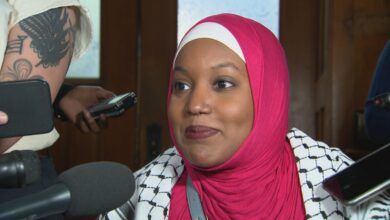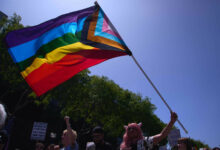Putin allies accuse Canada of interfering with Russia’s gay marriage vote
Prominent Russians with close ties to the Putin government are accusing Canada of interfering in that country’s constitutional vote on gay marriage by opposing a ban.
Russians have been voting for the past week on a series of constitutional amendments, the most significant of which would effectively allow President Vladimir Putin to continue in the job for the rest of his life.
Another of the amendments includes a stipulation that marriage can only be between a man and a woman. Opponents claim other changes on the table will cement deeply conservative ideology into the constitution and set Russia back centuries.
‘Less inclusive’
Five Western nations issued a joint statement on Pride Month 2020, including Canada, the United States, Australia, New Zealand and the U.K.
The statement calls on Russia’s government “to adhere to its stated commitment to protecting the rights of all citizens, including the lesbian, gay, bisexual, transgender and intersex (LGBTI) community.”
In a video posted to Facebook by a Russian LGBTQ group, Canada’s ambassador to Russia also addressed the constitutional amendment that’s on the table. Alison LeClaire suggested a “yes” vote would lead to a “less inclusive” situation for members of the nations’ LGBTQ community.
“In Russia, this situation [over gay rights] is compounded by an increase in violence and intimidation of the community by local authorities and other actors … and proposals for constitutional amendments that if adopted would lead to an increasingly less inclusive national legal framework,” she said.
On Monday, one of Russia’s most influential talk shows on state television, 60 Minutes, played the video and ripped into LeClaire accusing her — and Canada’s government — of political interference.
‘She will burn in hell’
“She will burn in hell,” said an irate Pyotr Tolstoy, a deputy speaker and member of the Putin-friendly United Russia party in Russia’s parliament during the show.
He then launched into a personal attack on LeClaire.
“This woman, the ambassador of Canada, is a typical representative of this type of single, middle aged ‘dame’ who are activists for the promotion of LGBTQ agendas in Europe, in America, in Canada, and now here,” Tolstoy said.

Igor Korotchenko, chief editor of National Defence, another well-connected Kremlin publication, suggested LeClaire needs to be punished and perhaps removed from her post.
“At the very minimum, this ambassador should be called in by the Ministry of Foreign Affairs, and she should be officially and decisively be issued a protest of meddling in the internal affairs of Russia,” he said on the show.
Yvgeny Popov, the host, nodded in agreement.
“When the ambassador of Canada in the middle of our vote on the constitution — where we will decide if we are for or against, but we will decide — she is telling us how to vote, how are we supposed to react?” he said.
Another panellist, Valery Fadeev, who’s a member of Russia’s Presidential Council on Human Rights, echoed the sentiment.
“Of course, what the ambassador is showing is a provocation and meddling in internal affairs,” he said.
The U.S. ambassador to Russia also released a video statement on Pride Month, but only LeClaire’s video made mention of the upcoming constitutional vote.
CBC News asked Global Affairs Canada for a response to the outburst on Russian TV and the slurs aimed at the ambassador, but its statement did not directly address the issue.
“Every year, Canadian missions across the globe fly the flag and offer words of support to LGBTQ2 communities during Pride,” Global Affairs said.
Since 2014, Canada’s embassy staff in Moscow have adopted a low profile as the bilateral relationship entered a deep chill following Russia’s annexation of Crimea and its ongoing support for separatists in eastern Ukraine.
A notable exception has been on the issue of gay rights, where Canada has been more forceful on LGTBQ issues, including opposing a 2013 Russian law that banned gay “propaganda.”
In 2017, Canada also accepted dozens of gay men from the Russian republic of Chechnya as refugees, many of whom had been tortured and driven from their homes.
Attitudes evolving
Gay and lesbian activists in Russia say on one hand, Russian attitudes toward homosexuality are evolving. But since Putin’s return to the presidency in 2012, the political environment has deteriorated.
“We will return not just to Soviet times, this will take us back even further,” said Karina Kuznetsova, who lives with her partner Julia Potetkehina in a flat in Saint Petersburg, said of the proposed constitutional amendments. The couple runs a LGBTQ -themed café called Rainbow.
“This will take us back to the 16th century how I see it, with these types of amendments, because we will have just one person in charge — like a tsar.”
Kuznetsova told CBC News that Putin’s government has tried to whip up hostility toward gay lifestyles, especially as economic conditions in the country deteriorated.
Now, she says, “we are blamed for everything.”
“We need fresh blood, fresh ideas, fresh thinking … but we have just gotten stuck now and we are going further and further down,” she said.
‘Traditional values’
In a poll on LGBTQ attitudes in Russia, released in April 2019 by the independent Levada Center, a polling and research organization, said there had been noticeable improvements in attitudes toward gay people. Almost half of those surveyed suggesting they deserved the same rights as other citizens.
However, in another more recent poll that involved personal interviews with more than 1,600 Russians this May, Levada reported roughly one in five Russians believe LGBTQ people should be “eliminated.”
The longer Putin has served as president, the closer he has tried to align himself with Russia’s Orthodox church and, along with that, promote so-called “traditional values.”
“As far as ‘parent number one’ and ‘parent number two’ goes, I’ve already spoken publicly about this and I’ll repeat it again: As long as I’m president this will not happen. There will be dad and mum,” Putin said in February after announcing the constitutional amendments.
The constitutional proposals also include clauses that emphasize differences between Russia and liberal democratic Western nations — including banning anyone who has ever held residence in another country from running for the presidency.
The move would prevent most Russian “liberals,” many of whom have studied or lived in Europe or North America, from challenging Putin.
No progress
Prominent author and government critic Dmitry Glukovsky penned a scathing rebuttal to the constitutional vote — and changing the terms of Putin’s presidency — in the opposition paper Novaya Gazeta.
“Once you are in power, you want to stay in power,” Glukvosky told CBC News in an interview.
“You can’t actually move your country forward because you are someone who is supposed to ‘conserve’ the situation, not find solutions — not reform, not progress, because they are all sources of danger to stability.
“You value stability overall — of which you are the main beneficiary.”
There’s little evidence that Putin’s proposed changes have stirred up much excitement with voters, who have until Wednesday to cast ballots.
The Kremlin-supported “yes” side has even resorted to free giveaways with offers of money, cars and apartments to get people motivated to vote.
CBC








Redes Sociais - Comentários